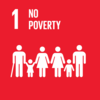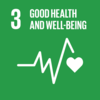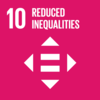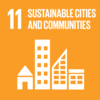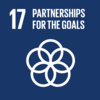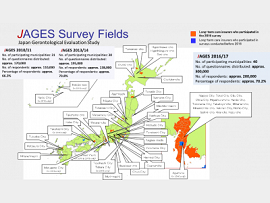Achieving Equity in Healthy Longevity: Japan Gerontological Evaluation Study


Naoki Kondo
Graduate School of Medicine
School of Public Health Associate Professor
Healthy ageing has been an important global agenda in the field of public health, and it is essential to achieve equity in care provision and longevity. The Japan Gerontological Evaluation Study (JAGES) aims to create a scientific evidence-based system for achieving a society with healthy and equitable longevity. In the JAGES, researchers have collaborated with 40 municipalities across Japan and conducted a survey for 300 thousand communities dwelled by older adults. More than 30 researchers have been involved, with the funding from the governments of Japan and the United States (NIH).
The JAGES deals with a wide range of health determinants including depression, diet, falling, physical activities, and other behaviors; but it has a special focus on the social determinants for healthy longevity and long-term care needs: social inactivity, isolation, hobby, community activities, abuse, household composition, childhood social conditions, and community’s social capital, among other factors.
The JAEGS has revealed the levels and characteristics of health inequality among Japanese older adults. The JAGES has also conducted a community intervention study aiming to reduce health inequality in community settings.
The JAGES is a highly collaborative program with participating municipalities. We make the partnerships throughout the entire process of the research from data gathering to knowledge creation to translation.
The JAGES deals with a wide range of health determinants including depression, diet, falling, physical activities, and other behaviors; but it has a special focus on the social determinants for healthy longevity and long-term care needs: social inactivity, isolation, hobby, community activities, abuse, household composition, childhood social conditions, and community’s social capital, among other factors.
The JAEGS has revealed the levels and characteristics of health inequality among Japanese older adults. The JAGES has also conducted a community intervention study aiming to reduce health inequality in community settings.
The JAGES is a highly collaborative program with participating municipalities. We make the partnerships throughout the entire process of the research from data gathering to knowledge creation to translation.
Related links
Research collaborators
- Jun Aida (Tohoku University)
- Toshiyuki Ojima (Hamamatsu Medical University)
- Katsunori Kondo (Chiba University; Primary investigator)
- Masashige Saito (Nihon-Fukushi University)
- Toshiyuki Ojima (Hamamatsu Medical University)
- Katsunori Kondo (Chiba University; Primary investigator)
- Masashige Saito (Nihon-Fukushi University)
Related publications
- Hikichi H, Aida J, Kondo K, Tsuboya T, Matsuyama Y, Subramanian S, Kawachi I : Increased risk of dementia in the aftermath of the 2011 Great East Japan Earthquake and Tsunami. PNAS 2016 113 (45) E6911-E6918; published ahead of print October 24, 2016.
- Tani Y, Kondo N, Nagamine-Takahashi Y, Shinozaki T, Kondo K, Kawachi I, Fujiwara T :Childhood socioeconomic disadvantage is associated with lower mortality in older Japanese men: the JAGES cohort study. International Journal of Epidemiology, 2016, 1-10,doi: 10.1093/ije/dyw146,Original article.
- Kondo N, Saito M, Hikichi H, Aida J, Ojima T, Kondo K, Kawachi I :Relative deprivation in income and mortalityby leading causes AMONG older Japanese men and women: AGES cohort study: J Epidemiol Community Health. 2015 Jul;69(7):680-5. doi: 10.1136/jech-2014-205103. Epub 2015 Feb 19.
- Tani Y, Kondo N, Nagamine-Takahashi Y, Shinozaki T, Kondo K, Kawachi I, Fujiwara T :Childhood socioeconomic disadvantage is associated with lower mortality in older Japanese men: the JAGES cohort study. International Journal of Epidemiology, 2016, 1-10,doi: 10.1093/ije/dyw146,Original article.
- Kondo N, Saito M, Hikichi H, Aida J, Ojima T, Kondo K, Kawachi I :Relative deprivation in income and mortalityby leading causes AMONG older Japanese men and women: AGES cohort study: J Epidemiol Community Health. 2015 Jul;69(7):680-5. doi: 10.1136/jech-2014-205103. Epub 2015 Feb 19.
Contact
- Email: kondolab2[at]m.u-tokyo.ac.jp
※[at]=@


